11 start with P start with P
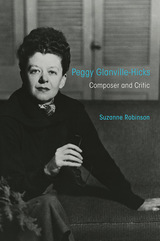
Drawing on interviews, archival research, and fifty-four years of extraordinary pocket diaries, Suzanne Robinson places Glanville-Hicks within the history of American music and composers. "P.G.H." forged alliances with power brokers and artists that gained her entrance to core American cultural entities such as the League of Composers, New York Herald Tribune, and the Harkness Ballet. Yet her impeccably cultivated public image concealed a private life marked by unhappy love affairs, stubborn poverty, and the painstaking creation of her artistic works.
Evocative and intricate, Peggy Glanville-Hicks clears away decades of myth and storytelling to provide a portrait of a remarkable figure and her times.
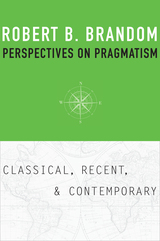
Pragmatism has been reinvented in every generation since its beginnings in the late nineteenth century. This book, by one of today’s most distinguished contemporary heirs of pragmatist philosophy, rereads cardinal figures in that tradition, distilling from their insights a way forward from where we are now.
Perspectives on Pragmatism opens with a new accounting of what is living and what is dead in the first three generations of classical American pragmatists, represented by Charles Sanders Peirce, William James, and John Dewey. Post-Deweyan pragmatism at midcentury is discussed in the work of Wilfrid Sellars, one of its most brilliant and original practitioners. Sellars’ legacy in turn is traced through the thought of his admirer, Richard Rorty, who further developed James’s and Dewey’s ideas within the professional discipline of philosophy and once more succeeded, as they had, in showing the more general importance of those ideas not only for intellectuals outside philosophy but for the wider public sphere.
The book closes with a clear description of the author’s own analytic pragmatism, which combines all these ideas with those of Ludwig Wittgenstein, and synthesizes that broad pragmatism with its dominant philosophical rival, analytic philosophy, which focuses on language and logic. The result is a treatise that allows us to see American philosophy in its full scope, both its origins and its promise for tomorrow.
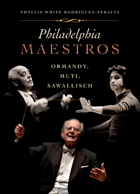

This first thorough biography of the gifted Pierre Boulez interrelates four major aspects of his professional life: as composer, as conductor, as polemicist for new music, and as musico-political entrepreneur. Lively, intimate, and knowledgeable, it will fascinate concertgoers and students of contemporary music, and will be an especially valuable handbook for those who own recordings of the music. Dominique Jameux develops a comprehensive life history of Boulez, marking all the milestones. We observe the composer at study and at work: the relationship—personal and intellectual—between Boulez and Messiaen; the organization of the Domaine Musical concerts for performance of avant-garde music as well as the launching of IRCAM, an institute for experiments with new musical techniques; Boulez’s teaching experiences, particularly at Darmstadt and Harvard; his discussions with other composers; and his seasons as conductor of the New York Philharmonic, of the BBC Symphony, and of Wagner at Bayreuth.
Many major artistic names figure in this story—Messiaen, Cage, Stockhausen, Maderna, the conductor Rene Leibowitz, the actor Jean-Louis Barrault, as well as several great performers. In Part II, Jameux discusses in detail twelve representative compositions, ranging from the flute sonatina of 1946 to Répons. Throughout the preparation of this book, Jameux had the advantage of interviews with Boulez, along with many informal meetings; the result of the author’s direct contact with his subject is a lucid and reliable introduction to the music, ideas, and activities of one of the leading musical thinkers and doers of our day.
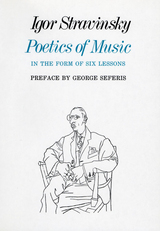

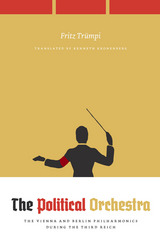
Trümpi looks first at the decades preceding National Socialist rule, when the competing orchestras, whose rivalry mirrored a larger rivalry between Berlin and Vienna, were called on to represent “superior” Austro-German music and were integrated into the administrative and social structures of their respective cities—becoming vulnerable to political manipulation in the process. He then turns to the Nazi period, when the orchestras came to play a major role in cultural policies. As he shows, the philharmonics, in their own unique ways, strengthened National Socialist dominance through their showcasing of Germanic culture in the mass media, performances for troops and the general public, and fictional representations in literature and film. Accompanying these propaganda efforts was an increasing politicization of the orchestras, which ranged from the dismissal of Jewish members to the programming of ideologically appropriate repertory—all in the name of racial and cultural purity.
Richly documented and refreshingly nuanced, The Political Orchestra is a bold exploration of the ties between music and politics under fascism.
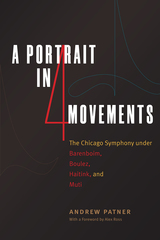
The Chicago Symphony Orchestra has been led by a storied group of conductors. And from 1994 to 2015, through the best work of Daniel Barenboim, Pierre Boulez, Bernard Haitink, and Riccardo Muti, Andrew Patner was right there. As a classical music critic for the Chicago Sun-Times and WFMT radio, Patner was able to trace the arc of the CSO’s changing repertories, all while cultivating a deep rapport with its four principal conductors.
This book assembles Patner’s reviews of the concerts given by the CSO during this time, as well as transcripts of his remarkable radio interviews with these colossal figures. These pages hold tidbits for the curious, such as Patner’s “driving survey” that playfully ranks the Maestri he knew on a scale of “total comfort” to “fright level five,” and the observation that Muti appears to be a southpaw on the baseball field. Moving easily between registers, they also open revealing windows onto the sometimes difficult pasts that brought these conductors to music in the first place, including Boulez’s and Haitink’s heartbreaking experiences of Nazi occupation in their native countries as children. Throughout, these reviews and interviews are threaded together with insights about the power of music and the techniques behind it—from the conductors’ varied approaches to research, preparing scores, and interacting with other musicians, to how the sound and personality of the orchestra evolved over time, to the ways that we can all learn to listen better and hear more in the music we love. Featuring a foreword by fellow critic Alex Ross on the ethos and humor that informed Patner’s writing, as well as an introduction and extensive historical commentary by musicologist Douglas W. Shadle, this book offers a rich portrait of the musical life of Chicago through the eyes and ears of one of its most beloved critics.
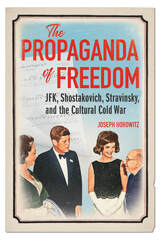
Eloquently extolled by President John F. Kennedy, the idea that only artists in free societies can produce great art became a bedrock assumption of the Cold War. That this conviction defied centuries of historical evidence--to say nothing of achievements within the Soviet Union--failed to impact impregnable cultural Cold War doctrine.
Joseph Horowitz writes: “That so many fine minds could have cheapened freedom by over-praising it, turning it into a reductionist propaganda mantra, is one measure of the intellectual cost of the Cold War.” He shows how the efforts of the CIA-funded Congress for Cultural Freedom were distorted by an anti-totalitarian “psychology of exile” traceable to its secretary general, the displaced Russian aristocrat/composer Nicolas Nabokov, and to Nabokov’s hero Igor Stravinsky.
In counterpoint, Horowitz investigates personal, social, and political factors that actually shape the creative act. He here focuses on Stravinsky, who in Los Angeles experienced a “freedom not to matter,” and Dmitri Shostakovich, who was both victim and beneficiary of Soviet cultural policies. He also takes a fresh look at cultural exchange and explores paradoxical similarities and differences framing the popularization of classical music in the Soviet Union and the United States. In closing, he assesses the Kennedy administration’s arts advocacy initiatives and their pertinence to today’s fraught American national identity.
Challenging long-entrenched myths, The Propaganda of Freedom newly explores the tangled relationship between the ideology of freedom and ideals of cultural achievement.

Available in English for the first time, Prosdocimo's Tractatus plane musice (1412) and Tractatus musice speculative (1425) are exemplary texts for understanding the high sophistication of music theory in the early fifteenth century. Known for considering music as a science based on demonstrable mathematical principles, Prosdocimo praises Marchetto for his theory of plainchant but criticizes his influential Lucidarium for its heterodox mathematics. In dismissing Marchetto as a “mere performer,” Prosdocimo takes up matters as broad as the nature and definition of music and as precise as counterpoint, tuning, and ecclesiastical modes. The treatises also reveal much about Prosdocimo’s understanding of plainchant; his work with Euclid's Elementa; and his familiarity with the music theory of Boethius, Macrobius, and Johannes de Muris. A foremost authority on Italian music theory of the Middle Ages and early Renaissance, Jan Herlinger consults manuscripts from Bologna, Cremona, and Lucca in preparing these valuable first critical editions.

A pyramid in front of the Louvre. Buffalo Bill's Wild West Show and The Rite of Spring. Schoenberg and Shirley Temple. Just as the odd juxtapositions of Modernism produced a new way of seeing, so now collage, in the hands of Glenn Watkins, offers a new perspective on the art of our age. A rich and revealing picture of twentieth-century music and the arts, Watkins' work shows us what our present Postmodern aesthetic owes to our Modernist past.
Behind the many guises of Modernism we find an appetite for opposing impulses: the exotic and the home-grown, high and low, black and white, the passionate and the cool, the cerebral and the instinctive. Watkins shows us these oppositions at play in the music of Stravinsky and Ravel, Debussy and Schoenberg, Ives, Satie, Hindemith, Ellington, and Gershwin, in the art of Picasso and the Cubists, Cocteau, Léger, Brancusi and Noguchi, in the anthologies of Nancy Cunard and Main Locke, in the ballet companies of Sergei Diaghilev and Rolf de Math, and in the performances of josephine Baker. Throughout, collage asserts its power to enlighten through juxtaposition, resist resolution, sponsor pluralism, and promote understanding of an order that eludes all edicts.
The masks of Oskar Schlemmer, of japanese No drama, and of the commedia dell'arte, the mythologies attendant to the retrieval of folk traditions and the emergence of jazz, and the mass relocation of artists in a time of war-all have a place in this depiction and assessment of the legacy of Modernism. A heady exploration of questions surrounding Primitivism, Orientalism, and technology as they surface at either end of our century, this book exposes the millennial preoccupations mutually invested in our search for "first times" and our convictions about "the end of culture"
READERS
Browse our collection.
PUBLISHERS
See BiblioVault's publisher services.
STUDENT SERVICES
Files for college accessibility offices.
UChicago Accessibility Resources
home | accessibility | search | about | contact us
BiblioVault ® 2001 - 2024
The University of Chicago Press









